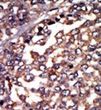Protein Kinase A regulatory subunit I alpha (PRKAR1A) (N-term) Rabbit Polyclonal Antibody
CAT#: AP15053PU-N
Protein Kinase A regulatory subunit I alpha (PRKAR1A) (N-term) rabbit polyclonal antibody, Purified
Other products for "PRKAR1A"
Specifications
| Product Data | |
| Applications | IHC, WB |
| Recommended Dilution | ELISA: 1/1,000. Western blotting: 1/100 - 1/500. Immunohistochemistry: 1/50 - 1/100. |
| Reactivities | Human |
| Host | Rabbit |
| Isotype | Ig |
| Clonality | Polyclonal |
| Immunogen | This antibody is generated from rabbits immunized with a KLH conjugated synthetic peptide selected from the N-terminal region of human PKR1. |
| Specificity | This antibody reacts to PKR1. |
| Formulation | PBS with 0.09% (W/V) sodium azide State: Purified State: Liquid purified Ig |
| Concentration | lot specific |
| Purification | Protein G column, eluted with high and low pH buffers and neutralized immediately, followed by dialysis against PBS |
| Conjugation | Unconjugated |
| Storage | Store the antibody undiluted at 2-8°C for one month or (in aliquots) at -20°C for longer. Avoid repeated freezing and thawing. |
| Stability | Shelf life: one year from despatch. |
| Gene Name | protein kinase cAMP-dependent type I regulatory subunit alpha |
| Database Link | |
| Background | cAMP is a signaling molecule important for a variety of cellular functions. cAMP exerts its effects by activating the cAMP-dependent protein kinase (AMPK), which transduces the signal through phosphorylation of different target proteins. The inactive holoenzyme of AMPK is a tetramer composed of two regulatory and two catalytic subunits. cAMP causes the dissociation of the inactive holoenzyme into a dimer of regulatory subunits bound to four cAMP and two free monomeric catalytic subunits. Four different regulatory subunits and three catalytic subunits of AMPK have been identified in humans. PKR1 is one of the regulatory subunits. This protein was found to be a tissue-specific extinguisher that down-regulates the expression of seven liver genes in hepatoma x fibroblast hybrids. Functional null mutations in the gene cause Carney complex (CNC), an autosomal dominant multiple neoplasia syndrome. The gene can fuse to the RET protooncogene by gene rearrangement and form the thyroid tumor-specific chimeric oncogene known as PTC2. |
| Synonyms | PKR1, PRKAR1, TSE1, CAR, CNC1 |
| Reference Data | |
Documents
| Product Manuals |
| FAQs |
| SDS |
{0} Product Review(s)
0 Product Review(s)
Submit review
Be the first one to submit a review
Product Citations
*Delivery time may vary from web posted schedule. Occasional delays may occur due to unforeseen
complexities in the preparation of your product. International customers may expect an additional 1-2 weeks
in shipping.






























































































































































































































































 Germany
Germany
 Japan
Japan
 United Kingdom
United Kingdom
 China
China




